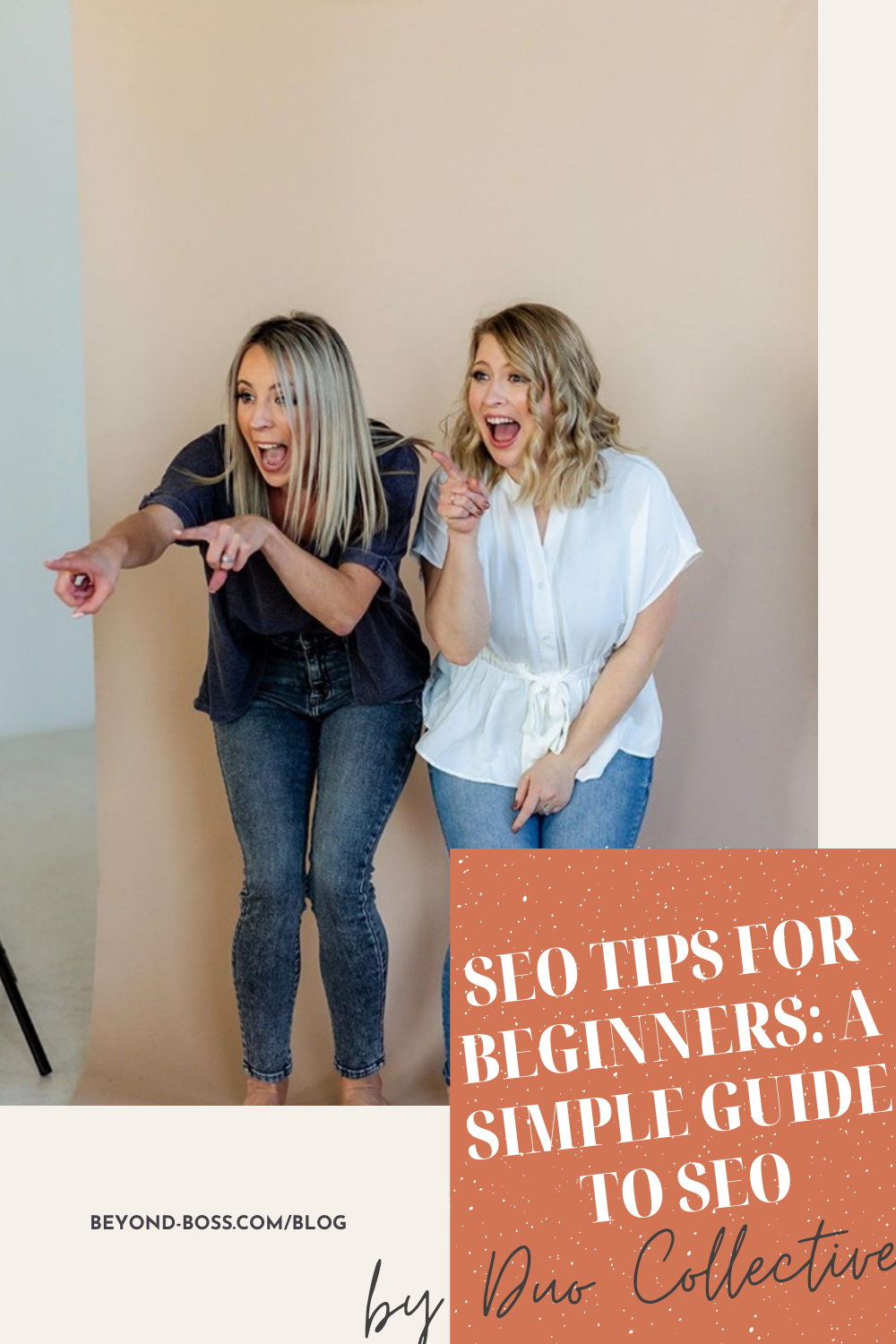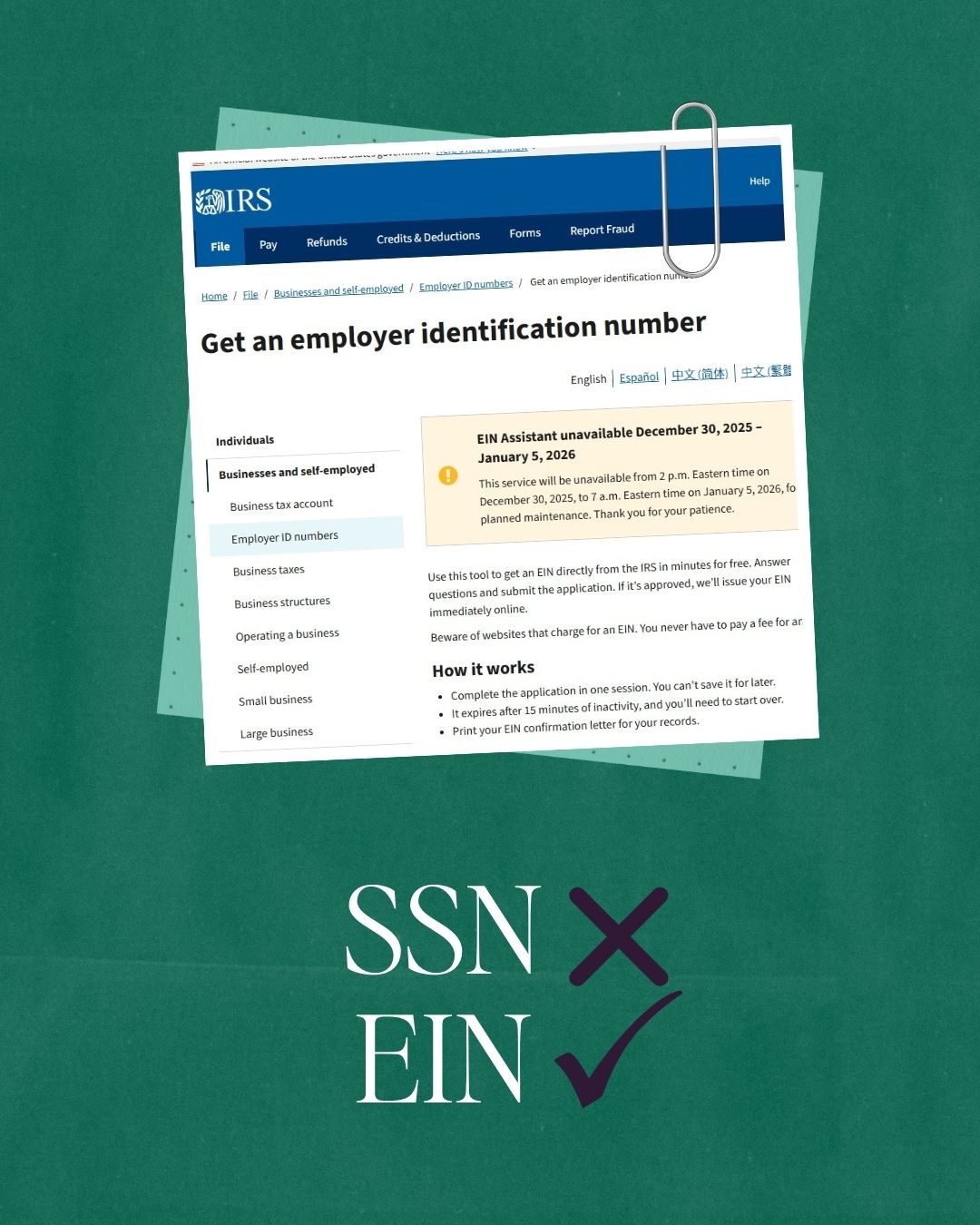SEO Tips for Beginners: A Simple Guide to SEO by The Duo Collective

April 28, 2021
SEO Tips for Beginners: A Simple Guide to SEO Terminology

Guest Blog Post by Duo Collective
Are you a creative entrepreneur, small business owner or blogger? Have you heard about how valuable this thing called SEO is, yet have no idea how to use it or implement those strategies into your business? Then keep reading, friend! We’ve read dozens of SEO Tips for beginners and terminology guides and even the most basic resources can feel overwhelming, making you want to close that window immediately. So, we wanted to start at the very beginning. Let’s take these three little letters and make SEO strategies feel simple and easy to understand for all of us newbies.
We want to break it down for you plain and simple. Here are our top SEO tips for beginners along with some key SEO terminology.
How do search engines work?
Let’s start at the very beginning, how do those search bars on sites like Google, Bing and Pinterest work? If you type in “how to make blueberry muffins” a dozen websites will pop up serving you recipes on blueberry muffins. Why did those websites appear? It’s because those terms “make blueberry muffins” appeared throughout the content letting Google know that this article is relevant to your search.
Seems easy, right? A lot of times, when learning SEO for the first time, business owners and bloggers will start to pepper their content with hundreds of these keywords. This is called keyword stuffing and it’s a big no-no! You will actually get penalized for doing this. Yes, Google will crawl your site for those keywords, but they will also verify your website against dozens of other criteria. This includes making sure your content makes sense to the end user – something called “readability”. Can you imagine if you typed in “how to make blueberry muffins” and instead of recipes, a bunch of websites popped up trying to sell you a blueberry muffin t-shirt?
So, tip number one in your SEO for beginners guidebook… you can’t fool Google, so don’t try!
What is SEO?
Now that you understand how search engines work, let’s jump into those three little letters: S.E.O. These letters stand for search engine optimization. Simply put, it’s the process of optimizing your website or online content for search engines so you can appear on that search engine results page (SERP) in order to drive more traffic to your website.
That’s it! The number one SEO term for beginners is just that.
So, why should you care about SEO for your small business?
Do you use your content as a way to build credibility with your audience? Do you share your portfolio or case studies as a way to attract new clients? Do you sell products or services on your website? Does your website have a contact form on it as a means to bring in new leads? Do you want to stand out amongst your competition? Do you want new customers and clients to be able to find you easily on Google?
If you answered yes to any one of these questions (which we hope is all of you!) then you should definitely be ensuring that your website and blog content are optimized for search. SEO tip for beginners number two: understanding why this strategy is so important is what will make your efforts even more successful.
How does Google index and rank your content?
As mentioned above, Google has a whole bunch of criteria it uses to index and rank your content in order to deem your website worthy of that first page of Google. The myth is that Google has over 200 ranking factors and there are many sites claiming to have that complete list. Ultimately, this information is locked deep in a vault at Google and us peasants can only begin to guess at what they are. ?Thankfully, there are some really smart people out there who can help us narrow down the different factors that actually matter. When learning SEO tips for beginners you’ll eventually want to understand each one of these factors, but for now, work on familiarizing yourself with the following terms:
- Keywords
- Meta description
- SEO titles
- Header tags
- Inbound and outbound links
- Image size
- Page speed
- Alt text
What are SEO keywords?
According to Merriam Webster, a keyword is “a significant word from a title or document used as an index to content”. Now, let us explain it to you like we are sitting down for happy hour…it’s a word or phrase carefully selected when writing website content, product descriptions, blog posts, etc. that helps people who are searching for that content, find YOU. Let’s pause for a second. That is pretty incredible. Think of it like a dating app for your business. By strategically selecting keywords, you can help search engines pair you with your future clients and customers.
There are two types of keywords: short tail keywords and long tail keywords. A short tail keyword consists of one or two words. Whereas a long tail keyword is 3-5 words paired together to make a relevant phrase. This is important to understand because you most likely will not rank on the first page of Google for a short tail keyword due to heavy competition. Therefore your focus should be to narrow in on long tail keywords that speak directly to your product, service and niche.
Let’s stick with our blueberry muffin analogy. A short tail keyword example could be “blueberry muffin recipe” whereas a long tail keyword could be “healthy blueberry muffin recipe” or “gluten free blueberry muffin recipe”. Not only will this help you rank higher on Google, with these longer tail keywords you are able to refine your content to speak directly to your niche audience.
In this section, we just identified a whole slew of new SEO Terms for Beginners. SEO keywords, short tail keywords and long tail keywords are all key terminology you should be adding to your list as we dive into the beginners world of SEO.
Two of our favorite SEO keyword tools?
Now that you understand what SEO keywords are, you might be wondering, how do I go about choosing the right SEO keywords for my website, course landing page, blog post, Pinterest posts, etc.? Great question! Here are two of our favorite – absolutely free – SEO keyword tools that you can use to find relevant, long tail keywords for your content.
Pinterest: Did you know Pinterest is also a search engine? Soon-to-be brides come to Pinterest to start planning their weddings. Those looking to create a healthier lifestyle might be searching for new diets or recipes. New homeowners may be searching for inspiration for their next house project. What is the one thing all these searchers have in common? They are craving education and ready to learn. Not to mention, it’s the only search engine that is visually appealing. This is where us creative folks can really stand out!
So how do you use Pinterest as an SEO keyword tool? More specifically, long tail keywords? It’s pretty simple. Type in the topic you want to start creating content on and simply watch Pinterest populate a longer tail keyword based on what people are searching for most. See the image below to see how this works.
Ubersuggest: This is probably our top favorite free SEO keyword tool. Much like Google’s Keyword Planner, it provides similarly related keywords and monthly search volumes, however, we find it incredibly more user friendly. And this is extremely important when learning SEO as a beginner. Plus, you get exact search volumes versus a range of “1,000 – 10,000 monthly searches” for example, that Keyword Planner might deliver.
SEO Tip for beginners number 82 – we lost count – grab a popular industry keyword (wedding photographer, small business copywriter, wedding flowers, etc.) and type that into ubersuggest’s search bar. This platform will tell you how often it’s searched each month, what the competition is and who else is ranking on page one of Google. Go try it out!
There you have it, a simple guide with SEO tips for beginners along with key terminology you should know.
We’ve really only scratched the surface of some SEO basics for beginners. The purpose of this post wasn’t to dive into every single ranking factor as many other beginners guides do. Instead, we wanted to simply help educate you on what SEO is and why it is an important marketing tool for your small business. Having a clear understanding of the topic is the first step to ranking on page one of Google.
So what’s next? If you are ready to take SEO into your own hands, then the SEO Beginners Guide Course is the perfect step. This SEO course will teach you exactly how to optimize your own website in order to be found on search engines. We also dive into how to grow your blog through free, organic search and what metrics to watch for in Google Analytics.
Don’t have the time to learn the basics of SEO yourself? Let us do it for you! Just send us an email at hello@duocollective.com inquiring about our SEO audit services. Don’t forget to follow us on Instagram for more SEO tips for beginners and free resources.
Caitlin Thomas is the founder of Beyond Boss, a Pittsburgh-based community and growth platform for women entrepreneurs. She’s a lifelong entrepreneur, professional photographer, and mama of two who is passionate about helping women build businesses that support full, meaningful lives, not constant burnout. Through Beyond Boss, Caitlin blends strategy, accountability, and real-life balance to help women grow with clarity, confidence, and intention.
written by
Caitlin Thomas
a few of our most used tools
Gorg, simple email marketing that keeps our brand consistent and creative.
Automates DMs for easy lead generation and engagement.
Handles contracts, invoices, and workflows all in one place.
This post may contain affiliate links, which means I may receive a commission at no additional cost to you if you make a purchase through one of the links. I only recommend products and services I trust.
More Awesome Posts...
start your journey by downloading our free resources
© beyond boss 2025. BEYOND BOSSⓇ IS A REGISTERED TRADEMARK.
Helping Pittsburgh women build powerhouse brands that grow with them.
hello@beyond-boss.com
NAVIGATE
home
about
agency
blog
membership
resources
SHOP
PRIVACY POLICY
FOLLOW ALONG ON IG











Comments Off on SEO Tips for Beginners: A Simple Guide to SEO by The Duo Collective